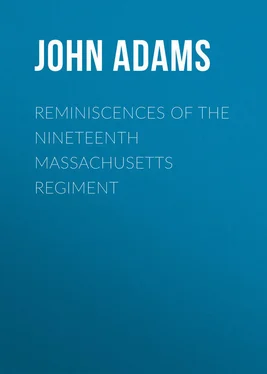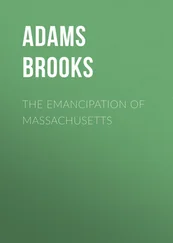John Adams - Reminiscences of the Nineteenth Massachusetts regiment
Здесь есть возможность читать онлайн «John Adams - Reminiscences of the Nineteenth Massachusetts regiment» — ознакомительный отрывок электронной книги совершенно бесплатно, а после прочтения отрывка купить полную версию. В некоторых случаях можно слушать аудио, скачать через торрент в формате fb2 и присутствует краткое содержание. Жанр: foreign_antique, foreign_prose, Историческая проза, на английском языке. Описание произведения, (предисловие) а так же отзывы посетителей доступны на портале библиотеки ЛибКат.
- Название:Reminiscences of the Nineteenth Massachusetts regiment
- Автор:
- Жанр:
- Год:неизвестен
- ISBN:нет данных
- Рейтинг книги:4 / 5. Голосов: 1
-
Избранное:Добавить в избранное
- Отзывы:
-
Ваша оценка:
- 80
- 1
- 2
- 3
- 4
- 5
Reminiscences of the Nineteenth Massachusetts regiment: краткое содержание, описание и аннотация
Предлагаем к чтению аннотацию, описание, краткое содержание или предисловие (зависит от того, что написал сам автор книги «Reminiscences of the Nineteenth Massachusetts regiment»). Если вы не нашли необходимую информацию о книге — напишите в комментариях, мы постараемся отыскать её.
Reminiscences of the Nineteenth Massachusetts regiment — читать онлайн ознакомительный отрывок
Ниже представлен текст книги, разбитый по страницам. Система сохранения места последней прочитанной страницы, позволяет с удобством читать онлайн бесплатно книгу «Reminiscences of the Nineteenth Massachusetts regiment», без необходимости каждый раз заново искать на чём Вы остановились. Поставьте закладку, и сможете в любой момент перейти на страницу, на которой закончили чтение.
Интервал:
Закладка:
We enjoyed the pleasures of Rockville but a short time after our detail joined the company, as we were ordered back to camp. A new company, recruited in Salem and commanded by Capt. Chas. U. Devereaux, a brother of our lieutenant-colonel, had joined the regiment. They were given the letter H and nicknamed the “Lapstone Light Infantry,” old Company H being disbanded and the men transferred to other companies.
March 1, by order of Colonel Hincks, I assumed the duties of first sergeant, and of all the trying positions I have ever filled this was the most so. If any one thinks that the life of an orderly sergeant in active service is an amiable one let him try it. When the men are not growling about you the captain is growling at you, and you are constantly between two fires. About one-third of the men in Company A had been members of the “Old Battalion,” and the town meeting tactics that prevailed in the militia had not quite died out. I was a recruit, and my promotion was not hailed with joy by the old men. It was said by them that they were detailed for guard rainy days, and that in other ways I favored the new men. They drew up a petition asking for a change, and some twenty men signed it and, through a committee, presented it to Captain Merritt. “What is this?” said the captain. “A petition for a change in first sergeant,” was the reply. “Petition! This is mutiny. Go to your quarters, and if I hear more of this I will have every man court-marshalled and sent to ‘Dry Tortugus!’” That settled the youngsters, and I was ever after obeyed and respected.
CHAPTER IV
About the middle of March we broke camp and took up our line of march for our first campaign. We bade good-by to our tents, which had sheltered us since we left Massachusetts, and sent them to Washington with our extra personal baggage, where I expect they are to-day, as we never received them again. We marched to the river, then up the tow-path of the canal to Harper’s Ferry, forded the Potomac at Point of Rocks, and for the first time our feet pressed the sacred soil of Virginia. We saw here the devastations of war, – the ruins of the old arsenal that had been burned by the rebels, the dilapidated and vacant houses, – but most interesting to us was the old engine-house, where John Brown made his gallant fight. This we found filled with rebel prisoners. “Truly,” we said, “his soul is marching on.” As soon as arms were stacked we rushed to the arsenal ruins for relics. I found an old gun-lock and several other parts of muskets. These I packed in my knapsack, – and the next day threw them away. With other regiments we marched up the valley to join Banks’s division, and bivouacked at Charlestown in the field where John Brown was hanged.
The next morning Company A was ordered back to Harper’s Ferry for provost duty. The rest of the regiment marched on, but in a few days returned and took position on Bolivar Heights, occupying deserted houses. Captain Merritt was appointed provost marshal at the ferry and everything was soon in military order, the company quartered in houses, the officers boarding in the town. One day Captain Merritt, with a detail from the company, made a seizure of several barrels of whiskey and a keg of gin, which were taken to a vacant store and a guard placed over them. Somehow the keg of gin disappeared; where it had gone no one knew. The next day was our last in town, having been ordered to join the regiment quite early in the morning. I noticed some of the men were very happy, but as we had been called by the other companies “Merritt’s Sabbath school children,” I thought it possible they were rehearsing for a Sabbath school concert. The increase of the spiritual manifestations told me that the cause of the inspiration must be the gin, and that it was not far away. After searching awhile I found the missing keg in the cellar. Unlike many of the men, it was nearly empty. In the midst of the seance Captain Merritt arrived. He came to order me to have the company in line ready to move at once. When he saw the condition of some of the men I guess he thought we had better move in ambulances. As we were going the rounds of the rooms we met Ben Falls, perfectly sober, having just been relieved from guard. Captain Merritt (referring to the condition of the company) said, “Ben, I am astonished.” “Well,” said Ben, “it is not my fault; I have been on guard, but I will get just as full as the rest as soon as I find the stuff.” When the time came to march all were in fair condition, and before we reached Bolivar Heights, as good as ever. As it was the first offence the men were let off with a lecture from the captain, and as the opportunity was never again presented, the offence was not repeated.
With Captain Devereaux, who joined us at Muddy Branch, came more recruits, and the regiment was now full, Company A having had for a few days one hundred and two enlisted men, several of the old men were discharged, bringing us down to the required number. A fine band was attached to the regiment, and having become very well drilled in the manual, our dress parades were almost perfect, and were witnessed by nearly all the soldiers and citizens in the town.
March 24 we received marching orders. Crossing the river we took cars at Point of Rocks for Washington, where we arrived the next day. We remained in Washington two days, then marched to the navy yard and took the old transport “North America” for Fortress Monroe.
In no place is the life of a soldier so hard as on a transport. Crowded between decks like cattle, unable to cook or even make coffee, they must subsist on what rations are issued and drink the water from the casks. The crews are always liberally supplied with miserable whiskey, which they sell at a high price to those who will buy, and a few men are always found in every regiment who will get drunk if they have a chance. On shore the guard-house can be resorted to, but on board ship there is no relief from this unbearable nuisance. I do not want it understood that drunkenness was general in the army, for many men went through the war without touching liquor, and in my four years’ experience I never saw an officer or enlisted man intoxicated when going into battle. I believe that what was true during the war has been true since, and that in no organization – not temperance – can be found so many total abstainers to the number of men as can be found in the ranks of the Grand Army of the Republic.
Our trip down the Potomac was pleasant, but soon after leaving the river a sudden storm struck us; our old craft leaked badly and we feared we should be swamped. The captain dared not continue, and put back to Point Lookout. Here we found a deserted hotel and several cottages. We did not stop to register, but took possession of the rooms and passed a comfortable night. Next morning we re-embarked, and reached Fortress Monroe during the night. The following day we landed and marched to Hampton, where we found the Army of the Potomac awaiting the arrival of our division. We encamped here about two weeks, quartered in Sibley tents. We were not required to drill often, and the time was pleasantly passed in visiting the several Massachusetts regiments in the army.
Early in April the grand Army of the Potomac moved towards Yorktown. It was a grand army , every regiment having its full quota. The experience of the previous months had made them reliable as soldiers. Incompetent officers and disabled men had been discharged, and those now on duty were filled with patriotic enthusiasm. They only desired a chance to fight, clear up the war and go home. Every man had confidence in General McClellan, and almost believed that he was sent by the Lord to lead us to victory. Whenever he appeared every head was uncovered and every voice raised in loud hurrahs.
Читать дальшеИнтервал:
Закладка:
Похожие книги на «Reminiscences of the Nineteenth Massachusetts regiment»
Представляем Вашему вниманию похожие книги на «Reminiscences of the Nineteenth Massachusetts regiment» списком для выбора. Мы отобрали схожую по названию и смыслу литературу в надежде предоставить читателям больше вариантов отыскать новые, интересные, ещё непрочитанные произведения.
Обсуждение, отзывы о книге «Reminiscences of the Nineteenth Massachusetts regiment» и просто собственные мнения читателей. Оставьте ваши комментарии, напишите, что Вы думаете о произведении, его смысле или главных героях. Укажите что конкретно понравилось, а что нет, и почему Вы так считаете.












